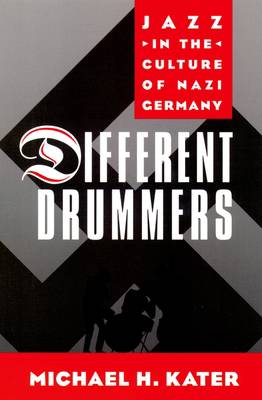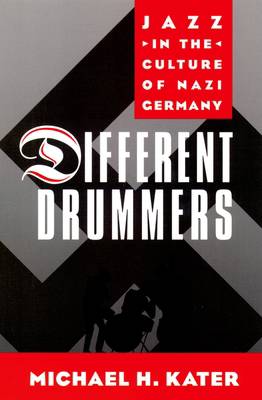
- Retrait gratuit dans votre magasin Club
- 7.000.000 titres dans notre catalogue
- Payer en toute sécurité
- Toujours un magasin près de chez vous
- Retrait gratuit dans votre magasin Club
- 7.000.000 titres dans notre catalogue
- Payer en toute sécurité
- Toujours un magasin près de chez vous
96,95 €
+ 193 points
Description
When the African-American dancer Josephine Baker visited Berlin in 1925, she found it dazzling. "The city had a jewel-like sparkle," she said, "the vast cafés reminded me of ocean liners powered by the rhythms of their orchestras. There was music everywhere." Eager to look ahead after the crushing defeat of World War I, Weimar Germany embraced the modernism that swept through Europe and was crazy over jazz. But with the rise of National Socialism came censorship and proscription: an art form born on foreign soil and presided over by Negroes and Jews could have no place in the culture of a "master race."
In Different Drummers, Michael Kater--a distinguished historian and himself a jazz musician--explores the underground history of jazz in Hitler's Germany. He offers a frightening and fascinating look at life and popular culture during the Third Reich, showing that for the Nazis, jazz was an especially threatening form of expression. Not only were its creators at the very bottom of the Nazi racial hierarchy, but the very essence of jazz--spontaneity, improvisation, and, above all, individuality--represented a direct challenge to the repetitive, simple, uniform pulse of German march music and indeed everyday life. The fact that many of the most talented European jazz artists were Jewish only made the music more objectionable.
In tracing the growth of what would become a bold and eloquent form of social protest, Kater mines a trove of previously untapped archival records and assembles interviews with surviving witnesses as he brings to life a little-known aspect of wartime Germany. He introduces us to groups such as the Weintraub Syncopators, Germany's best indigenous jazz band; the Harlem Club of Frankfurt, whose male members wore their hair long in defiance of Nazi conventions; and the Hamburg Swings--the most daring radicals of all--who openly challenged the Gestapo with a series of mass dance rallies. More than once these demonstrations turned violent, with the Swings and the Hitler Youth fighting it out in the streets. In the end we come to realize that jazz not only survived persecution, but became a powerful symbol of political disobedience--and even resistance--in wartime Germany. And as we witness the vacillations of the Nazi regime (while they worked toward its ultimate extinction, they used jazz for their own propaganda purposes), we see that the myth of Nazi social control was, to a large degree, just that--Hitler's dictatorship never became as pure and effective a form of totalitarianism as we are sometimes led to believe.
With its vivid portraits of all the key figures, Different Drummers provides a unique glimpse of a counter-culture virtually unexamined until now. It is a provocative account that reminds us that, even in the face of the most unspeakable oppression, the human spirit endures.
In Different Drummers, Michael Kater--a distinguished historian and himself a jazz musician--explores the underground history of jazz in Hitler's Germany. He offers a frightening and fascinating look at life and popular culture during the Third Reich, showing that for the Nazis, jazz was an especially threatening form of expression. Not only were its creators at the very bottom of the Nazi racial hierarchy, but the very essence of jazz--spontaneity, improvisation, and, above all, individuality--represented a direct challenge to the repetitive, simple, uniform pulse of German march music and indeed everyday life. The fact that many of the most talented European jazz artists were Jewish only made the music more objectionable.
In tracing the growth of what would become a bold and eloquent form of social protest, Kater mines a trove of previously untapped archival records and assembles interviews with surviving witnesses as he brings to life a little-known aspect of wartime Germany. He introduces us to groups such as the Weintraub Syncopators, Germany's best indigenous jazz band; the Harlem Club of Frankfurt, whose male members wore their hair long in defiance of Nazi conventions; and the Hamburg Swings--the most daring radicals of all--who openly challenged the Gestapo with a series of mass dance rallies. More than once these demonstrations turned violent, with the Swings and the Hitler Youth fighting it out in the streets. In the end we come to realize that jazz not only survived persecution, but became a powerful symbol of political disobedience--and even resistance--in wartime Germany. And as we witness the vacillations of the Nazi regime (while they worked toward its ultimate extinction, they used jazz for their own propaganda purposes), we see that the myth of Nazi social control was, to a large degree, just that--Hitler's dictatorship never became as pure and effective a form of totalitarianism as we are sometimes led to believe.
With its vivid portraits of all the key figures, Different Drummers provides a unique glimpse of a counter-culture virtually unexamined until now. It is a provocative account that reminds us that, even in the face of the most unspeakable oppression, the human spirit endures.
Spécifications
Parties prenantes
- Auteur(s) :
- Editeur:
Contenu
- Nombre de pages :
- 320
- Langue:
- Anglais
Caractéristiques
- EAN:
- 9780195165531
- Date de parution :
- 13-03-03
- Format:
- Livre broché
- Format numérique:
- Trade paperback (VS)
- Dimensions :
- 153 mm x 238 mm
- Poids :
- 449 g







